Letter from William Wilkins to John Bigler

Former Secretary of War William Wilkins writes California Governor John Bigler to recommends Samuel A. Dickey, the son of Representative John Dickey, for a position or an appointment.


Former Secretary of War William Wilkins writes California Governor John Bigler to recommends Samuel A. Dickey, the son of Representative John Dickey, for a position or an appointment.

John McLean, United States Postmaster, writes William Murphy, the Postmaster of Maysville, Kentucky, to remind him of the obligation to deliver letters on Sunday that "arrive on Saturday night." "Please conform to [this rule] and render the office

Second Continental Congress Representative John Adams writes to James Warren, a judge in Watertown, Massachusetts, and discusses the arrival of gunpowder, the formation of a continental treasury, and asks if "your new Legislative and Executive fee

Attorney Murray Rush writes to Franklin Pierce, President of the United States, campaigning for the district attorney position in Philadelphia.

Architect Benjamin Henry Latrobe writes to Mary Hazlehurst Latrobe, his second wife, about his dinner with President Thomas Jefferson. Latrobe discusses the other guests at the dinner and the his thoughts on building a drydock for the United

Andrew Carnegie writes to Funk & Wagnalls Company, a publishing company in New York City, thanking them for their gift of their new standard dictionary.

Philanthropist Andrew Carnegie writes Mr. Hitchcock to support the plan to build a music hall in New York City at Madison Square. Carnegie also provides advice on the site, size, and income yield of the proposed music hall.
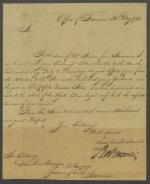
United States Superintendent of Finance Robert Morris writes to Don Luis Unzaga y Amezago, Governor of Cuba, about the return of Mr. Brown from his secret mission to Havana. Mr.

Mary Gurney writes to Charles A. Poulson and describes how she "went over to Brooklyn this morning" from New York City and recounts her activities during her brief stay.

James Smith, a signer of the Declaration of Independence as a representative of Pennsylvania, writes to Frederick Muhlenberg and complains that Mr. Lyon refuses to pay for cattle purchased to feed the troops at Carlisle. Transcript included.
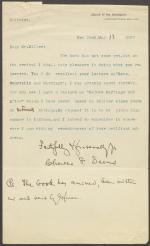
Charles Force Deems , writes Mr.

Edward Biddle writes to Jasper Yeates and Matthias Slough regarding "a favourable crisis approaching" in the form of the Constitutionalist party, then dominating the Pennsylvania government.
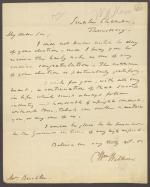
Senator William Wilkins writes Mr. Buckler and congratulates him on his election. Wilkins writes this letter from the Senate chamber in the United States Capitol.
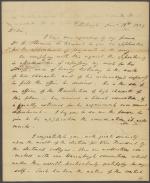
William Wilkins writes to Secretary of War John C. Calhoun and recommends the son of an officer who served during the American Revolution, Dr. H. Stevenson, as an army paymaster.
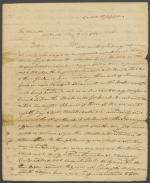
William Ramsey writes Secretary of War Alexander J. Dallas and discusses paying the soldiers. "As a precautionary measure I was to send on the Muster rolls for Mr.
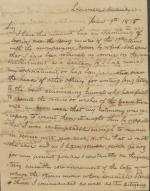
Captain Zachary Taylor writes to Inspector General Daniel Parker and resigns from the United States Army. After seven years of exemplary service, Taylor believes that he should have received a higher rank and more recognition.


Commissary General Callender Irvine (Class of 1794) writes Simon Philipson with instructions related to selling supplies to the government. “Please let the bearer have a sample of the buffalo hides w.

Supreme Court Chief Justice Roger B. Taney writes to Associate Supreme Court Justice Samuel Nelson regarding the composition of a dissenting opinion in the Prize Cases of 1863.
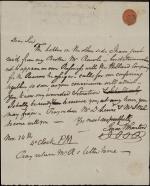
Isaac Wharton writes to Robert Waln and discusses attorney William Rawle's decision to note take sides in the prosecution of the Holland Company.
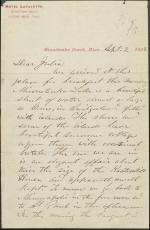
Former President Ulysses S. Grant writes to his wife, Julia Grant.
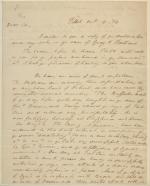
William Wilkins writes William Tilghman and discusses the latest news about the War of 1812.
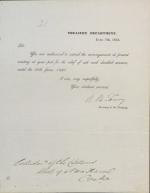
Treasury Secretary Roger Brooke Taney writes to the New Haven Collector of Customs, William H.
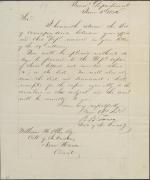
Treasury Secretary Roger Brooke Taney writes to the New Haven Collector of Customs, William H. Ellis, announcing the return of "the list of correspondence between your office and this department".
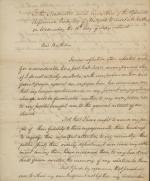
John Mitchell Mason writes to the Associate Reformed Presbytery of New York wishing to resign from his position as a minister.